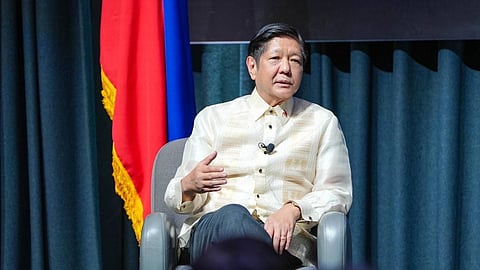
- NEWS
- the EDIT
- COMMENTARY
- BUSINESS
- LIFE
- SHOW
- ACTION
- GLOBAL GOALS
- SNAPS
- DYARYO TIRADA
- MORE

President Ferdinand Marcos Jr. issued on Easter Sunday an unequivocal statement that Philippine territorial integrity, as well as the right of Filipinos to live in peace, is under serious threat.
In issuing Executive Order 57, Mr. Marcos laid the premise for ordering concerned government agencies to ramp up the country’s territorial defense. He stressed that under assault is the Filipinos’ “fundamental right to live in peace and freedom, free from fear of violence and threat.”
“Despite efforts to promote stability and security in our maritime domain, the Philippines continues to confront a range of serious challenges that threaten not only the country’s territorial integrity but also the peaceful existence of Filipinos,” Marcos said.
“Strengthening the country’s maritime security and domain awareness is imperative to comprehensively tackle the crosscutting issues that impact the nation’s national security, sovereignty, sovereign rights, and maritime jurisdiction over its extensive maritime zones,” he added.
Under EO 57, the National Coast Watch Council (NCWC) was transformed into the National Maritime Council (NMC), chaired by Executive Secretary Lucas Bersamin. The body was given 60 days to create and disseminate guidelines for efficiently executing the order.
The secretaries of the National Security Council and most government departments were made members of the NMC, along with the Solicitor General and the director of the National Intelligence Coordinating Agency.
Earlier, the President warned China that it would not be “cowed into silence” following confrontations in the West Philippine Sea that injured Filipino troops and damaged vessels resupplying the BRP Sierra Madre in Ayungin Shoal.
‘On the brink’
Marcos’ fighting words came as Beijing lambasted the Philippines for allegedly raising tensions in the WPS, which China claims as part of the wider expanse of water, the South China Sea (SCS).
A 2016 Permanent Court of Arbitration ruling based in The Hague affirmed the Philippines’ sovereign rights in the WPS while declaring baseless China’s claim to nearly the whole SCS.
Chinese coast guard, navy, and militia vessels have repeatedly used water cannons and dangerous maneuvers against Philippine ships in the WPS. Following the last incident at Ayungin Shoal, Manila summoned a Chinese envoy.
The China Coast Guard defended its actions as “lawful regulation, interception and expulsion” of a foreign vessel that “tried to forcefully intrude” into Chinese waters.
Beijing then urged Manila to “pull back from the brink” and stop “provoking trouble at sea.”
“We seek no conflict with any nation, more so nations that purport and claim to be our friends, but we will not be cowed into silence, submission, or subservience,” Marcos said in a statement.
The President said the Philippines would respond with a “countermeasure package that is proportionate, deliberate, and reasonable in the face of the open, unabating, and illegal, coercive, aggressive, and dangerous attacks by agents of the China Coast Guard and the Chinese Maritime Militia.”
“Filipinos do not yield,” Marcos has said.
Without naming the United States among others, Beijing said the Philippines has been emboldened by its allies. “Relying on the backing of external forces... the Philippine side has frequently infringed on rights and provoked and created trouble at sea.”
Further, China accused the Philippines of “spreading false information to mislead the international community’s perception of the issue, which is, so to speak, going further and further down a dangerous road.”
Ayungin, also known as the Second Thomas Shoal, is about 200 kilometers from the western Philippine island of Palawan and more than 1,000 kilometers from China’s nearest major landmass, Hainan island.
The United States, a treaty ally of the Philippines, has led a chorus of support for the Southeast Asian country in response to Chinese actions.
Marcos said the international community had “offered to help us on what the Philippines requires to protect and secure our sovereignty, sovereign rights, and jurisdiction while ensuring peace and stability in the Indo-Pacific.”
“I have given them our requirements, and we have been assured that they will be addressed,” he said without providing details.
His statement came after US Defense Secretary Lloyd Austin repeated the United States’ “ironclad” commitment to its longtime ally in a call with his Filipino counterpart Gilberto Teodoro on Wednesday.
In reaction, the Philippine Coast Guard (PCG) said the EO and recent incidents would make it “step up” operations in areas in the WPS other than Ayungin Shoal.
“More or less, our job will still be the same. Maybe because of the incident, we might step up our operations, especially our maritime domain awareness, not only in the Ayungin area where there is always trouble, but in other areas as well, including Bajo de Masinloc,” he said in Filipino.
Balilo said the PCG will exhaust efforts to maintain its presence in the WPS. The Holy Week proved uneventful in the area, he said.
“While it’s good news, we don’t want to be complacent,” Balilo said of the lack of activity in the WPS between Philippine and Chinese vessels.
